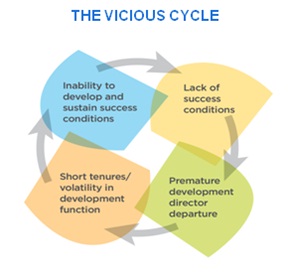Fundraising jobs can be hard to fill. Staff in this area often turn over at a high rate, and chief executives frequently express frustration at a lack of growth in fundraising.
The chaos in development staffing is highlighted by a recent study by CompassPoint. Key findings from the study:
- Half the development directors surveyed said they expect to leave their current jobs in two years or less.
- One in four CEOs reported that their previous development director was fired.
- More than half of the executives surveyed said their most recent development director search did not produce enough candidates with the right mix of skills and experience.
 An article in The Chronicle of Philanthropy ties problems with the development director position to a lack of support and fundraising knowledge coming from the CEO. The article quotes Robbe Healey, a member of the board of the Association of Fundraising Professionals, who was a research adviser for the study. "The reason that organizations have a hard time keeping competent development staff is that too many nonprofit leaders don’t understand fundraising," Healey says. "A skilled and experienced development director is not going to hook their reputation to your lack of readiness."
An article in The Chronicle of Philanthropy ties problems with the development director position to a lack of support and fundraising knowledge coming from the CEO. The article quotes Robbe Healey, a member of the board of the Association of Fundraising Professionals, who was a research adviser for the study. "The reason that organizations have a hard time keeping competent development staff is that too many nonprofit leaders don’t understand fundraising," Healey says. "A skilled and experienced development director is not going to hook their reputation to your lack of readiness."
The article warns against the temptation to place the burden of fundraising results solely on the development director. If you're whole fundraising plan relies on a single individual, you're likely to fail, it says. For one thing, a single person is not usually good at both asking for money from major donors and writing grant proposals.
What part does the board play? On one hand, CEOs and other staff are frustrated by their unmet expectations of board members' involvement in fundraising. On the other hand, board members feel an uncomfortable pressure to ask their friends for money. But board members role in fundraising goes beyond just asking. The board can focus attention on creating a culture that promotes fundraising success. They can take an interest in educating themselves about all aspects of the fundraising process, talk about whether expectations for fundraising results are realistic, and hold the CEO accountable for his/her role in leading the fundraising program.
From the Chronicle article:
Seventy-five percent of the executive directors said their trustees were insufficiently involved in raising money for their charities. Thirty-six percent said their boards had no fundraising committees, and 17 percent of CEO's said their boards had no involvement in fundraising at all.
"If someone joins a board and philanthropy isn't seen as part of his or her role, that's a very difficult thing to change," says Heather Malin, director of institutional advancement at the Cancer Research Institute. And even boards with active fundraising committees may not share a deep commitment to helping the charity raise money.
"Too often boards associate development with desperation and with having to give money themselves," says Ms. Malin.
One thing the board can do is make sure that staff fundraisers are not isolated in their role. Boards have the power, and indeed the obligation, to promote an institution-wide commitment to fundraising.
See more about the CompassPoint study here.
Read the article in The Chronicle of Philanthropy here.
Guest post by Nettia Shepper.
Image of fundraising by Howard Lake
Image of the Vicious Cycle by CompassPoint.